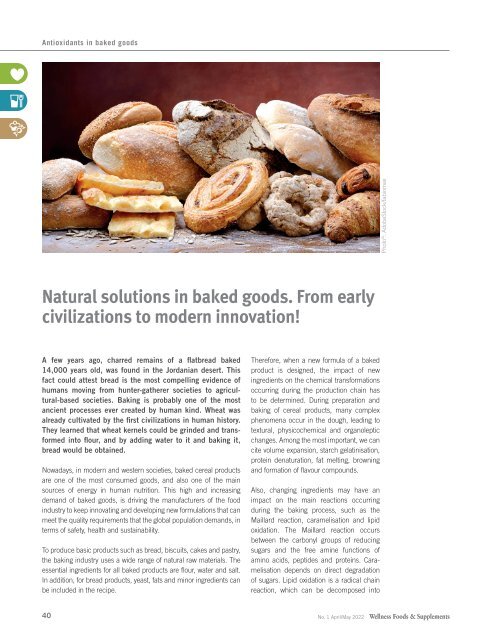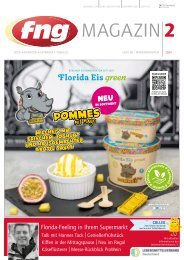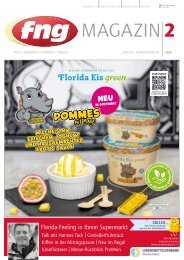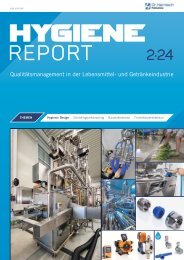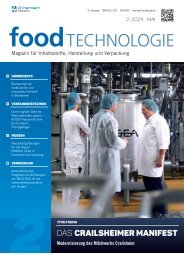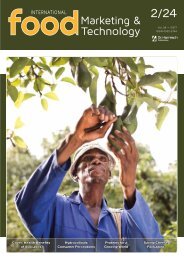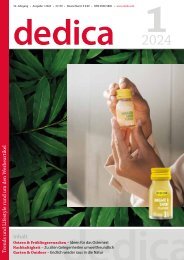Wellness Foods + Supplements 1/2022
Wellness Foods & Supplements is the first European magazine devoted exclusively to health ingredients, nutraceutical foods and beverages. Questions about the trade magazine Wellness Foods & Supplements? Interested in subscribing or advertising? The board of editors at Wellness Foods & Supplements kindly remains at your disposal.
Wellness Foods & Supplements is the first European magazine devoted exclusively to health ingredients, nutraceutical foods and beverages.
Questions about the trade magazine Wellness Foods & Supplements? Interested in subscribing or advertising? The board of editors at Wellness Foods & Supplements kindly remains at your disposal.
You also want an ePaper? Increase the reach of your titles
YUMPU automatically turns print PDFs into web optimized ePapers that Google loves.
Antioxidants in baked goods<br />
Photo © : AdobeStock/fabiomax<br />
Natural solutions in baked goods. From early<br />
civilizations to modern innovation!<br />
A few years ago, charred remains of a flatbread baked<br />
14,000 years old, was found in the Jordanian desert. This<br />
fact could attest bread is the most compelling evidence of<br />
humans moving from hunter-gatherer societies to agricultural-based<br />
societies. Baking is probably one of the most<br />
ancient processes ever created by human kind. Wheat was<br />
already cultivated by the first civilizations in human history.<br />
They learned that wheat kernels could be grinded and transformed<br />
into flour, and by adding water to it and baking it,<br />
bread would be obtained.<br />
Nowadays, in modern and western societies, baked cereal pro ducts<br />
are one of the most consumed goods, and also one of the main<br />
sources of energy in human nutrition. This high and increasing<br />
demand of baked goods, is driving the manufacturers of the food<br />
industry to keep innovating and developing new formulations that can<br />
meet the quality requirements that the global population demands, in<br />
terms of safety, health and sustainability.<br />
To produce basic products such as bread, biscuits, cakes and pastry,<br />
the baking industry uses a wide range of natural raw materials. The<br />
essential ingredients for all baked products are flour, water and salt.<br />
In addition, for bread products, yeast, fats and minor ingredients can<br />
be included in the recipe.<br />
Therefore, when a new formula of a baked<br />
product is designed, the impact of new<br />
ingredients on the chemical transformations<br />
occurring during the production chain has<br />
to be determined. During preparation and<br />
baking of cereal products, many complex<br />
phenomena occur in the dough, leading to<br />
textural, physicochemical and organoleptic<br />
changes. Among the most important, we can<br />
cite volume expansion, starch gelatinisation,<br />
protein denaturation, fat melting, browning<br />
and formation of flavour compounds.<br />
Also, changing ingredients may have an<br />
impact on the main reactions occurring<br />
during the baking process, such as the<br />
Maillard reaction, caramelisation and lipid<br />
oxidation. The Maillard reaction occurs<br />
between the carbonyl groups of reducing<br />
sugars and the free amine functions of<br />
amino acids, peptides and proteins. Caramelisation<br />
depends on direct degradation<br />
of sugars. Lipid oxidation is a radical chain<br />
reaction, which can be decomposed into<br />
40 No. 1 April/May <strong>2022</strong>


